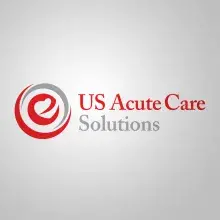Q&A: Dr. James DelVecchio – Silver Spring, Maryland
Where do you want to work?
US Acute Care Solutions serves more than 220 hospitals in 20 states. We want to help you learn about our locations by meeting physicians who practice there!
Here’s a Q&A Dr. James DelVecchio, MD, FACEP, Director of Integrated Acute Care for Holy Cross Health in Maryland. At Holy Cross Hospital, there are openings for an EM Physician, a Hospitalist Physician, and an EM-APP. At the newer Holy Cross Germantown Hospital, there are openings for an EM physician, a Hospitalist Physician, a Hospitalist APP, and a Hospitalist-Nocturnist APP.
Q. What drew you to Maryland?
A. Following residency, I had planned to move to Portland, Maine for an Emergency Medicine opportunity. My wife, who had family in the D.C. area, wanted to move closer to Washington, D.C. and specifically the Maryland suburbs. Like every married couple, we compromised. And did exactly what she wanted.
Q. What do you enjoy about working for the Holy Cross System?
A. The people and the mission. By people, I mean both the patients as well as medical staff. We have an extraordinarily diverse patient population, which requires taking into consideration not only geographic challenges related to international medicine, but also cultural differences in the way that patients and their families approach health and disease. The diversity of staff at Holy Cross health mirrors that of our patient population. Additionally, the mission of Holy Cross health has always been to care for those in the greatest need. I enjoy working in a healthcare system that welcomes the patients who are most in need, and often have the least support.
I have stayed here since completing my residency. I chose to come to Holy Cross partially because of their mission. And while a lot has changed over the past 26 years, the values and mission of the healthcare system have not wavered. Over the years, I have developed relationships across our healthcare system. While I carry the title of Director of Integrated Acute Care, and I am proud to work for USACS, on a day-to-day basis Holy Cross Health really is my family away from home.
Q. What is unique about your hospital system & locations that you don’t think you would find anywhere else?
A. While many hospital systems are branching out into community-based medicine, including partnering with primary care practices, etc., the majority of Holy Cross Health network patient care takes place in our four community-based clinics for the uninsured and underinsured. It’s a tremendous asset having such a strong safety net for our most vulnerable and at risk patients when they leave our emergency departments or hospital.
Q. What are some major health concerns/unique challenges for the specific population you serve?
We serve a large international population in our area. Some of these are undocumented, and are fearful of seeking medical care for fear that they may be identified as such. I believe this sometimes causes delay in seeking important medical care, and most likely prevents some of them from following up as needed.
Q. What kinds of opportunities can a physician expect at the Holy Cross System and at US Acute Care Solutions?
With USACS, a physician or APP can expect to be well supported, encouraged to be engaged, and surrounded by like-minded provider who believe in our mission: “To Care for Patients.” Specifically at Holy Cross Health, a provider can be expected to be welcomed and supported like family. The large majority of our provider started their careers at Holy Cross Health, and many like myself will start and finish their careers with our healthcare system. As much as I believe we work together as a team, we treat each other like family.
Q. How do you feel that USACS has supported you with challenges or opportunities?
Prior to partnering with USACS, we had a remarkably stable democratic physician owned practice (Silver Spring Emergency Physicians). However, changes in payer contracts combined with increases in costs for our benefits was making it more and more difficult for us to remain competitive. Partnering with USACS allowed us to continue as a physician-owned group, but with the economies of scale and support of a much larger organization. Recently, when Holy Cross Health put out a RFP (Request for Proposal) to supply emergency medicine, hospital medicine, and critical care coverage at our hospitals, had we still been our former business entity we would not have been able to put in a proposal. However, as part of USACS, we were able to put in a very competitive proposal and were chosen over six other competitors. Since July 1 of this year, USACS Integrated Acute Care now supplies emergency medicine and hospitalist coverage at both Holy Cross Hospital and Holy Cross Germantown Hospital, as well as critical care at Holy Cross Germantown Hospital. We would not have had this opportunity if we were not part of USACS.
Q. What’s the best advice you ever received as a physician?
When I was going through a very difficult time in my career after having been named in a malpractice lawsuit, I had a conversation with a physician who had been on our medical staff for a long time that I greatly respected. He reminded me that every patient I see in my Emergency Department came in because of some concern, some fear, some discomfort, and at that time their well-being needed to be my primary focus. From that point on, I have made it a point that before I work any clinical shift, and before I walk into any patient room, I try to clear my mind of all of the other things that could be worrying me, and focus on the patient and their family.
Q. What’s the most important advice you give to new physicians?
Your career is a marathon, not a sprint. And to succeed, you need to be well conditioned for that marathon. Take care of yourself. Take care of your family. If you don’t do these well, you cannot take as good care of your patients.
Q. What would you say to someone considering a position at your hospital?
I offer any potential new provider the key to success with working at Holy Cross Health with USACS. You need to be prepared to work hard, and play well in the sandbox. This doesn’t mean that everyone coming in will be the highest performing provider, the fastest, or the most efficient. But everyone who works here comes expecting that we will all put in our best effort. And playing well in the sandbox is what gets you through the rough times. Anyone prepared to do these two things will succeed. Everything else, we can work on as needed.
Q. What do you do to encourage a quality work environment?
Most importantly, I want feedback from our entire staff about what can be done better to provide high quality and safe patient care. The frontline providers, who spend most of their time caring for patients, are the most likely ones to identify potential issues related to care and quality. At the same time, they are the most likely ones to come up with a good solution.
Q. What are some of the reasons you became a physician?
When presented with a problem, I naturally try to come up with a solution (which, by the way, is not always the right thing to do when talking with your spouse!). While there are many careers where problem-solving is involved, I knew that I wanted to do something that dealt with people. Medicine has given me the opportunity to be a people-based problem solver.
Q. Can you share with me one of your memorable moments as a physician?
During a busy evening in the Emergency Department, a young man was rushed back to one of the ED rooms with a concern of an acute poisoning. He was tachycardic, tachypneic, and severely diaphoretic. While the nurses were busy starting an IV, hooking him up to a monitor, and getting an EKG, I took a careful history. He reports that he had just met a very attractive young lady at a local bar. After he excused himself to go to the bathroom, he returned to the bar to finish drinking his beer. However, he noticed that there was something shaking around at the bottom of the beer can, and became convinced that he had been poisoned by this young lady he had just met. He started developing symptoms of lightheadedness, dizziness, and tingling in his fingers. He drove himself to the Emergency Department and presented himself to triage, looking acutely ill, fearful that he had been poisoned. I asked him if by chance the beer he was drinking was a Guinness. The patient, along with the nurses, were quite surprised by this question. However, he admitted that it was, and he had the can out in his car in case we needed to “test” for any poisons. I asked the nurses to take him off the monitor and let him go out to the car to get the beer can. He returned with it, and I pointed out the warning on the can that mentioned about the “widget” in the can of Guinness that releases nitrogen when the can is opened in order to create a creamier, longer lasting head on the beer. The patient’s vital signs all normalized, and he was released just a bit embarrassed. To this day, I can’t look at a can of Guinness without getting a smile on my face.
About Dr. DelVecchio
James DelVecchio MD, FACEP, is USACS’ director of Integrated Acute Care for Holy Cross Health in Maryland.
Dr. DelVecchio earned his medical degree at the Georgetown University School of Medicine and complete his internship in internal medicine and residency in emergency medicine at Albany Medical Center. He has been at Holy Cross Hospital since completing residency and helped open the nation’s first Seniors Emergency Department, as well as the Holy Cross Germantown Hospital.
Outside the ED, Dr. DelVecchio enjoys spending time with his wife and four sons. He is active as a leader in Boy Scouts and enjoys backpacking, kayaking, fishing, boating, and RVing.
More about Holy Cross Hospital, Holy Cross Germantown Hospital
Holy Cross Hospital is a 443-bed, not-for-profit teaching hospital caring for more than 192,000 patients each year. The hospital is the nation’s leader in caring for senior patients, their families and caregivers. USACS is responsible for both the Hospitalist Service and Emergency Department for Holy Cross, and the team includes a dedicated nocturnes and 24-hour intensivists. The Emergency Department sees more than 75,000 patients annually and is one of the largest in Maryland. In addition to the Senior Emergency Center, there is a dedicated Pediatric Emergency Center, with a separate zone for Express Care for all patients.
Holy Cross Germantown Hospital opened in 2014 and features a full scope of medical services, a 15-bed Intensive Care Unit, and two 30-bed units for non-ICU patients, as well as a Behavioral Health unit for psychiatric care. The team of eight Hospitalist providers sees an average of 42 patients daily. The Emergency Department serves 28,000 patients annually and has 14 beds, including two specialized rooms for behavioral needs.


